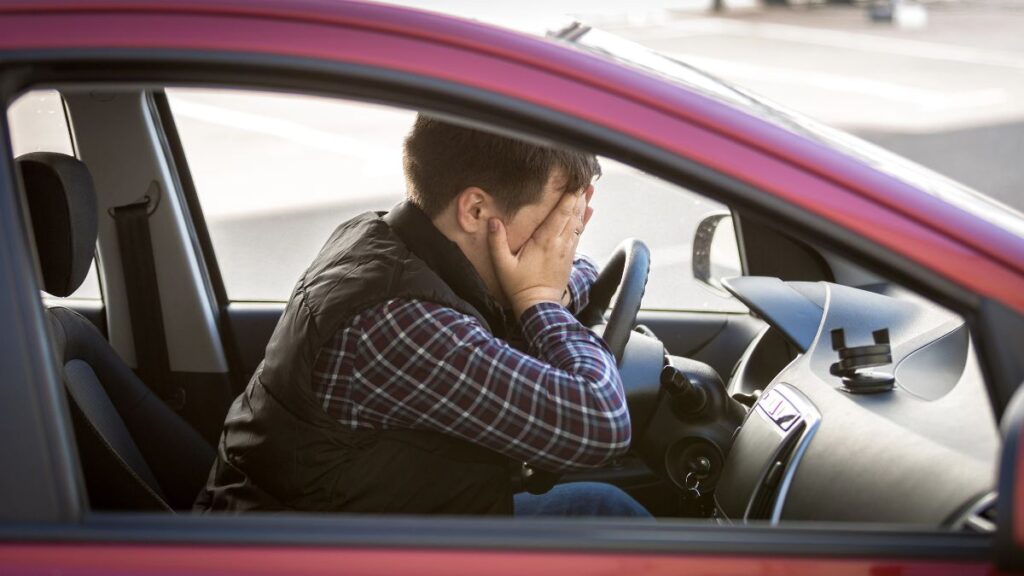15 Questions You Should Avoid Answering If The Police Pull You Over
Getting pulled over by the police can be a stressful experience, and it’s important to know your rights. During a traffic stop, police officers may ask questions that could feel intrusive or intimidating, especially if you’re unsure how to respond. It’s crucial to understand that not all questions require a direct answer, and in some cases, it may be in your best interest to avoid answering altogether.
Knowing which questions to sidestep can help protect your rights, keep you from unintentionally incriminating yourself, and ensure that the interaction remains smooth and respectful. By staying calm, knowing your rights, and being mindful of the information you share, you can navigate a traffic stop with confidence and composure. Here are 15 questions you should consider avoiding during a traffic stop to keep yourself safe and informed.
“Do You Know Why I Pulled You Over?”

When an officer asks if you know why you were pulled over, it’s often best to remain silent or respond with a polite question of your own, such as, “Can you tell me why?” Answering this question directly could inadvertently provide the officer with information they may not have had before, which could work against you in the long run.
For instance, if you admit to speeding or making an illegal turn, this admission can be used as evidence against you, even if the officer wasn’t originally aware of the specific infraction. By asking the officer to explain the reason for the stop, you maintain control over the information shared and ensure that any statements you make are intentional and thought out rather than a knee-jerk reaction to a leading question.
“Have You Been Drinking?”

If an officer asks if you’ve been drinking, your response must be cautious. While it might be tempting to quickly deny having consumed any alcohol, it’s worth noting that you are not legally required to answer this question. If the officer suspects you’ve been drinking, they are likely to proceed with a field sobriety test or request a breathalyzer test, regardless of your response.
By choosing to remain silent or politely declining to answer, you avoid giving the officer additional reasons to escalate the situation based on your words alone. Remember, any admission of alcohol consumption, no matter how small, could lead to further questioning, testing, and potential complications that could otherwise be avoided.
“How Much Have You Had to Drink?”

Similar to being asked if you’ve been drinking, the question of how much you’ve had to drink is another one that can be tricky to navigate. This question is designed to gauge your level of impairment, and any response you give could be used as evidence to suggest that you’re under the influence. Even a seemingly harmless response, such as admitting to just one drink, can be interpreted in ways that aren’t in your favor. Instead of answering directly, you have the right to remain silent or politely decline to answer.
If the officer insists on assessing your sobriety, it’s best to cooperate with any required tests while being mindful not to volunteer information that could be used against you later.
“Do You Mind If I Search Your Vehicle?”

When an officer asks if they can search your vehicle, it’s important to know that you have the right to refuse if they don’t have a warrant or probable cause. Agreeing to a search can sometimes be interpreted as giving consent, which can complicate your situation if the officer finds something you weren’t aware of or didn’t intend to disclose.
Politely declining the request and asking if the officer has a warrant or specific reason for the search is a way to assert your rights without being confrontational. It’s also worth noting that refusing a search doesn’t imply guilt; it’s simply a way to protect your privacy and ensure that any search conducted is lawful and justified.
“Where Are You Coming From?”

During a traffic stop, an officer might ask where you’re coming from, but it’s important to know that you don’t have to disclose this information. This question can be used to build a profile of your activities, and depending on your answer, it could lead to further questioning that may not be in your best interest.
While it might seem like a casual inquiry, it’s often a way for officers to gather more context about your movements and potentially uncover inconsistencies in your story. To avoid unnecessary complications, it’s best to keep your responses focused on the essentials, such as providing your license and registration, rather than volunteering details about your recent whereabouts.
“Where Are You Going?”

Similar to being asked where you’re coming from, the question of where you’re heading can also be one to approach with caution. While it might seem like an innocent inquiry, disclosing your destination can give the officer additional context about your travel plans, which could be used to justify further questioning or investigation.
Whether you’re on your way to work, home, or somewhere else entirely, this information isn’t required to be shared during a traffic stop. By keeping the conversation focused on the immediate reason for the stop and providing only the necessary documents, you can help ensure that the interaction remains straightforward and limited to what’s legally required.
“Can You Tell Me Your Home Address?”

You’re generally not obligated to provide your home address during a traffic stop unless it’s specifically requested in connection with the ticket or citation being issued. While officers may ask this question as part of their routine, sharing your home address might be unnecessary and could lead to more intrusive questions about your personal life.
If you feel uncomfortable or unsure about why the information is being requested, you can politely ask the officer for clarification or provide only the information that’s directly relevant to the situation. Keeping your responses brief and to the point helps maintain your privacy while still complying with lawful requests.
“Do You Have Any Drugs in the Car?”

If an officer asks whether you have drugs in your vehicle, it’s important to remember that you’re not required to answer. This type of inquiry is often a tactic to provoke a confession or cause you to volunteer information that could be used against you. Even if you have nothing to hide, answering this question could lead to further complications, such as a request to search your vehicle or additional questioning about your activities.
In this scenario, the best course of action is to politely decline to answer and refrain from discussing the contents of your vehicle. If the officer has probable cause, they may proceed with a search, but it’s crucial to avoid providing information that could be misconstrued or used against you.
“Have You Ever Been Arrested?”

Discussing your past arrest history during a traffic stop is generally not necessary and can lead to unnecessary complications. This information is personal and irrelevant to the current situation, and you have the right to keep it private.
If an officer asks about your arrest history, you should focus on providing the necessary documentation and complying with lawful orders rather than delving into your past. By keeping the conversation focused on the present and avoiding discussions about your criminal history, you help prevent the stop from escalating into a more serious situation.
“Do You Have Any Weapons in the Car?”

While you may need to inform the officer if you are carrying a weapon for safety reasons, you are not required to answer questions about weapons in a way that could incriminate you. If you do have a weapon in the car, it’s important to inform the officer calmly and clearly, following their instructions to ensure everyone’s safety.
However, if asked whether you have any weapons without a clear reason, it’s best to be cautious in your response. Sharing too much information could lead to unnecessary searches or further questioning. Keep your responses factual and brief, focusing on complying with legal requirements without volunteering additional details.
“Are You on Probation or Parole?”

Your status regarding probation or parole is personal and should not be discussed during a traffic stop unless it’s directly relevant to the situation. Sharing this information could complicate the stop or lead to further questioning that may not be in your best interest. If an officer asks whether you’re on probation or parole, it’s important to remember that you’re not obligated to answer unless required by law.
Keeping the conversation focused on the immediate traffic stop and avoiding discussions about your legal status can help prevent the interaction from becoming more complicated or intrusive.
“Can You Explain This Contradiction?”

If an officer points out a contradiction in your story or explanation, you are not required to elaborate or provide additional details. Providing more information in an attempt to clarify could lead to more questions and potential complications, as the officer might use your words to build a case against you.
It’s better to provide basic, truthful information as needed and avoid getting drawn into a detailed discussion. If you’re unsure how to respond, it’s okay to remain silent or ask for legal counsel, ensuring that your rights are protected throughout the interaction.
“Why Are You Nervous?”

Feeling nervous during a traffic stop is common, and you’re not required to explain why you might be anxious. Nervousness alone is not a reason for further questioning or suspicion, and officers should recognize that the stress of the situation can cause anyone to feel uneasy. If an officer asks why you’re nervous, it’s important to remain calm and remember that you don’t have to justify your emotions.
Focus on providing the necessary documentation and answering any legally required questions, but don’t feel compelled to explain your feelings or behavior during the stop.
“Can You Provide a Detailed Account of Your Day?”

An officer may ask for a detailed account of your day to gauge your level of impairment or investigate further, but you’re not required to provide this information. Sharing a detailed account of your day can lead to further questions or inconsistencies that might complicate the situation.
Instead, keep your responses simple and focused on the purpose of the stop, providing only the necessary information. If you feel uncomfortable with the questioning, it’s okay to politely decline to answer and ask to speak with an attorney if needed.
“Are You Sure You’re Not Under the Influence?”

This question is leading and may be used to assess your impairment or prompt a confession. You have the right to remain silent and avoid making statements that could be used against you later. Instead of responding directly, it’s better to focus on cooperating with any field tests or breathalyzer tests if requested while avoiding any verbal admissions that could complicate your situation.
By staying calm and mindful of your rights, you can navigate this line of questioning without inadvertently incriminating yourself or escalating the situation.
15 Practical Ways to Save Money During Retirement

Entering retirement doesn’t have to mean giving up a comfortable lifestyle. With strategic planning and simple adjustments, it’s possible to make the most of your retirement income and enjoy a financially secure life.
15 Practical Ways to Save Money During Retirement
15 Foods Only The Wealthy and Elite Can Eat Now

Culinary trends are constantly evolving, and some foods have become more than just sustenance—they’ve become status symbols reserved for the elite.







